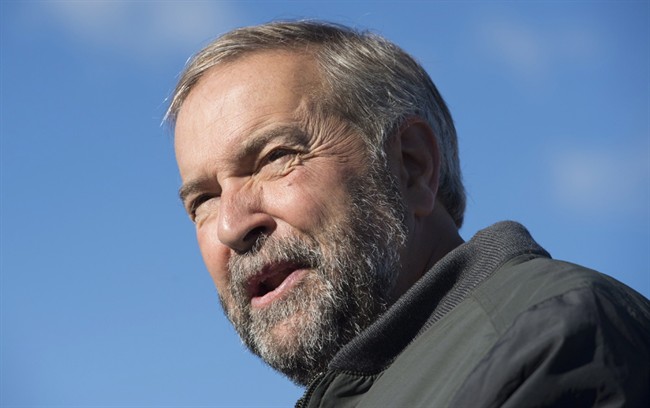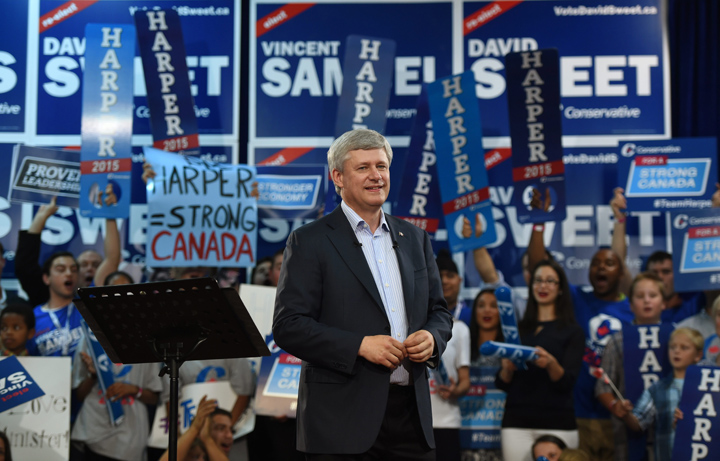OTTAWA – Since the start of the election campaign, Liberals and New Democrats have made repeated allegations that Harper’s Conservatives delivered eight consecutive budgetary shortfalls.

“Despite Stephen Harper’s promise of balanced budgets, he has run eight straight deficits…” – Liberal Party news release distributed Tuesday.
“Stephen Harper has run eight straight deficits.” – New Democrat Leader Thomas Mulcair on Twitter on Aug. 18.
How accurate are their claims?
Spoiler Alert: The Canadian Press Baloney Meter is a dispassionate examination of political statements culminating in a ranking of accuracy on a scale of “no baloney” to “full of baloney.”
This one earns a rating of “a lot of baloney”: the statement is mostly inaccurate but contains elements of truth.
The Facts

After producing a surplus in 2007-08 of $9.6 billion, the Harper government delivered a deficit of $5.8 billion in 2008-09 during the global recession.
In subsequent years, his Conservative governments generated shortfalls of $55.6 billion in 2009-10; $33.4 billion in 2010-11; $26.3 billion in 2011-12; $18.4 billion for 2012-13; and $5.2 billion for 2013-14.
To summarize, Harper-led governments ran a string of six straight deficits between 2008-09 and 2013-14.
But looking beyond 2013-14, the numbers have yet to be released, which means it’s difficult to predict the final results with absolute certainty.
To begin, let’s look at whether the government will even hit seven straight deficits.
The Harper government predicted a $2-billion deficit for the 2014-15 fiscal year in its April budget. The fiscal year ended in March but the final tally is only expected to come out later this month.
The Finance Department’s own preliminary estimate for 2014-15, released earlier this year, said the government remained on track to run a small shortfall.
The Department’s fiscal monitor said preliminary numbers show Ottawa had a surplus of $2.9-billion for 2014-15, but it noted the tally didn’t include several end-of-year adjustments, including final tax revenues and valuation adjustments for assets and liabilities.
The document also said the total didn’t account for the fiscal impact of some government initiatives, such as the $1.6-billion enhancement tied to the new veterans charter and the $1.1-billion change to the universal child care benefit.
“Taking these and other expected year-end adjustments into account, results to date are broadly in line with a small deficit in 2014-15, as projected in Budget 2015,” the fiscal monitor said.
However, despite the government’s forecast and the early figures, there is some evidence suggesting Ottawa will balance earlier than expected.
The parliamentary budget officer projected in April that the government would post a $3.4-billion surplus in 2014-15.
In-Depth: Federal Election 2015
But if we assume the 2014-15 number will be printed in red ink – let’s look at the probability of another shortfall in 2015-16.
In the spring budget, the Conservatives forecast a $1.4-billion surplus for 2015-16.
But since then, a weakening economy and lowered projections by experts – including the Bank of Canada – have created doubts whether the government will, in fact, be able to balance the books.
In July, the parliamentary budget officer crunched numbers based on the Bank of Canada’s downgraded economic growth forecast. It found the federal government was actually on track to run a $1-billion deficit in 2015-16.
But with the 2015-16 fiscal year barely five months old, it’s still early to pin down what the final figure will be.
In fact, Canadians won’t know whether their government delivered an eighth consecutive shortfall until about a year from now – or roughly 11 months past the Oct. 19 election date.
What the opposition parties say

John McCallum, a long-time Liberal and former bank economist, said his party based its allegation on the six shortfalls already on the books, the government’s own 2014-15 deficit prediction and the parliamentary budget officer’s projection for 2015-16.
McCallum, however, acknowledged that despite “strong evidence” pointing to a seventh and an eighth deficit, one can never be certain until the books are finalized.
“I suppose we could say six deficits for sure and two projected deficits, but that’s a bit long-winded,” McCallum said in an interview.
“I think it is fair to say eight straight deficits based on the government’s own budget in one case, and the PBO in the other case and six final numbers in the other six cases.”
Similarly, the New Democrats said that after the first six confirmed deficits under Harper’s governments, the seventh one is based on the government’s own projection and the eighth on the PBO’s July estimate for a narrow 2015-16 shortfall.
The verdict

Without the final numbers for the 2014-15 and 2015-16 fiscal years, it’s impossible to say with certainty whether the Harper government produced eight consecutive shortfalls.
Projections and the country’s recent economic performance provide some clues, but more information is needed to back up such a categorical assertion.
For these reasons, the statement that the Conservative government ran eight straight deficits contains “a lot of baloney.”
Methodology

The Baloney Meter is a project of The Canadian Press that examines the level of accuracy in statements made by politicians. Each claim is researched and assigned a rating based on the following scale:
No baloney – the statement is completely accurate
A little baloney – the statement is mostly accurate but more information is required
Some baloney – the statement is partly accurate but important details are missing
A lot of baloney – the statement is mostly inaccurate but contains elements of truth
Full of baloney – the statement is completely inaccurate


Comments